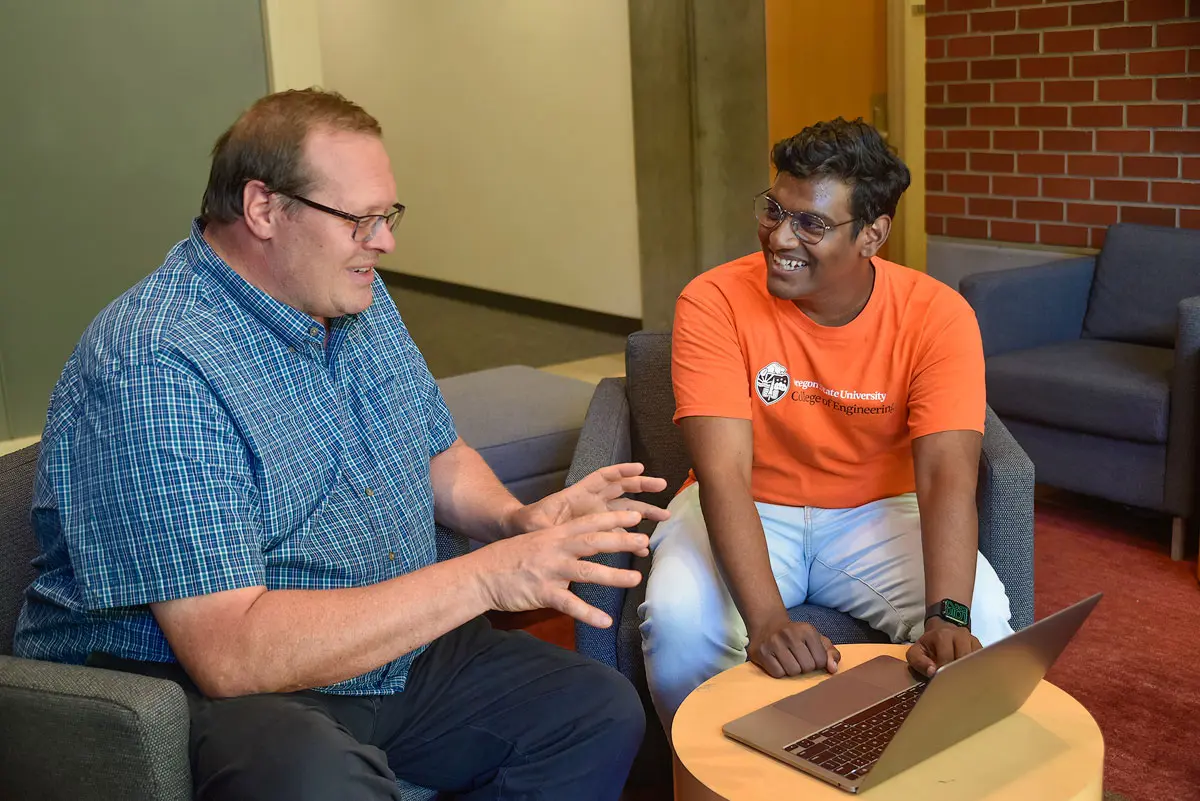Graduate students at Oregon State University are creating artificial intelligence solutions for university and industry partners for projects such as customer behavior prediction, automated configuration for industrial printers, urban noise modeling, and AI-driven educational tools.
The nine-month capstone projects are an experiential learning component of the nation’s first multidisciplinary graduate program for master’s and doctoral degrees in AI. Proposals for future master’s capstone projects may be submitted online by Sept. 12.
“I got a lot out of doing the capstone project. I feel really confident in taking an idea and turning it into a solution,” said Madeline Spawn, B.S. computer science ’24, M.S. artificial intelligence ’25. "My employer also saw that experience and is looking to transition me to a new AIML team.”
Predicting urban noise levels with an AI model
Spawn collaborated with master’s student Suhas Sumukh on a project for College of Health researchers studying the health impacts of urban noise in Portland to inform public health policies and strategies. The students designed a new deep learning model using different data types than the original regression model used. The result was improved performance.
“We came up with an idea to use satellite images and digital surface models, merge the data into a multi-modal model, and then train it to predict the noise level at every single point in the city,” Sumukh said.
The students are co-authors on a paper that will be submitted for publication, and Sumukh is continuing work to refine the model with Matthew Bozigar, the assistant professor leading the project.
AI printer configuration assistant
In a collaboration with HP, students created an AI system that automates industrial printer settings by analyzing documents and integrating the information with a large language model.
Suriyakrishnan Sathish, M.S. computer science ’25, and Rujula More, M.S. computer science ’25, who both minored in AI, developed a solution using a new AI tool called the Model Context Protocol that connects data sets and LLMs, eliminating the need for a custom chatbot.
HP was looking for an AI assistant that could integrate user data and printer manuals to help operators select optimal settings to run print jobs on various types of paper substrates, including for magazines, cardboard boxes, and laminated papers.
“I was learning about state-of-the-art technology which was just coming out as we were working on the project,” Sathish said.

The students learned about HP's research and development process through regular weekly meetings with Pieter van Zee, chief software strategist at HP’s PageWide Industrial business unit, where they collaborated and together refined innovative concepts.
Customer purchase behavior prediction
Steelport Knife Co., a Portland-based startup producing American-made kitchen knives, partnered with Janita Aamir, M.S. computer science ’25, on a project to leverage AI for predicting customer repurchases and product preferences. Aamir analyzed data to identify effective strategies for integrating AI into Steelport’s marketing and customer acquisition processes.
“Janita’s work helped our team to get a much better understanding of how to integrate AI into our customer acquisition flow, and we also learned about the limitations of AI,” said Ron Khormaei, Steelport’s founder and CEO. “The marketing team especially appreciated understanding how AI can be used to prioritize investments and better utilize customer data.”

AI-based educational assistant
John Zontos, B.S. computer science ’22, M.S. artificial intelligence ’25, worked with Jonathon Kalodimos, associate professor of finance, to create an educational tool for finance students.
The AI chatbot, called FinanceTutor.ai, helps students learn course material for two introductory finance classes by creating an individualized experience. The chatbot answers students’ questions, tests their knowledge, and gives them study prompts by drawing from their textbooks. Still in development, Kalodimos is aiming to expand it for use in more classes.
Behind the scenes on all of the AI capstone projects is Alan Fern, professor of computer science, who advises the students throughout the development process.
"Professor Fern is great,” Spawn said. “He's so knowledgeable and wants to make sure that you're going to succeed.”
Contact Alan Fern with questions about the AI capstone projects.





